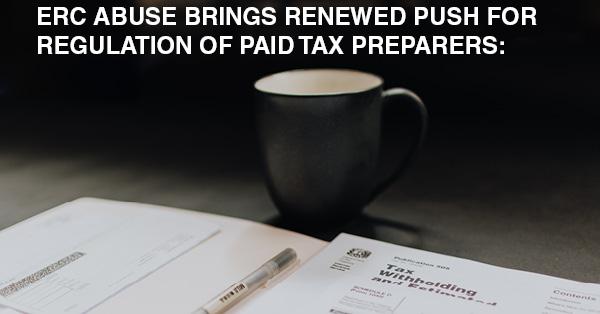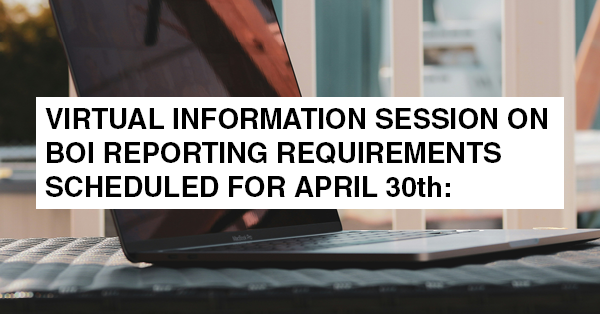ERC ABUSE BRINGS RENEWED PUSH FOR REGULATION OF PAID TAX PREPARERS:

Abuse of the employee retention credit (ERC) by aggressive promoters who make questionable promises has pushed Treasury to renew the call for the regulation of paid tax return preparers, an action that has the AICPA's support.
In a letter last week to the leaders of the Senate Finance Committee, Deputy Treasury Secretary Wally Adeyemo asked Congress to provide the IRS with the authority to regulate paid preparers. The regulation "could help protect taxpayers from penalties, interest, or avoidable costs of litigation that result from poor quality advice that they receive," he wrote.
Adeyemo also asked Congress to consider other ways to reduce fraud in the ERC, such as passing legislation targeting contingency fees. This "would help prevent overzealous promoters from profiting off small businesses," he wrote.
The ERC mills promote the credit online and in television ads, advising small businesses to come to them even if their CPA told them that they do not qualify for the ERC. Large upfront contingency fees are one sign of an ERC mill, as is a company that will not sign the amended payroll tax returns.
If the IRS audits the ERC claim and finds that the taxpayer received it in error, the benefit must be repaid, and the taxpayer is out any fee paid upfront.
The ERC was a refundable tax credit for businesses that paid workers during the COVID-19 pandemic while their operations were fully or partially suspended because of a government order or for those that had a significant decline in gross receipts during the eligibility period. It was available from March 31, 2020, to Sept. 30, 2021, with a deadline of Dec. 31, 2021, for recovery startup businesses.
The IRS has received 3.6 million ERC claims, and of the 600,000 (15%) currently unprocessed by the IRS, virtually all were filed in the past 90 days, IRS Commissioner Danny Werfel said last week when he announced a moratorium on processing of ERC claims, along with other actions.|
So far, the Service has paid $230 billion in ERC claims, an IRS representative said last week.
The moratorium on processing new claims began immediately and will continue through at least the end of 2023, Werfel said. The IRS will continue to process the remaining 600,000 ERC claims filed before the moratorium was announced Sept. 14, but at a slower pace due to stricter compliance reviews.
The IRS will provide details later about how a taxpayer can withdraw an ERC claim, which will allow taxpayers to avoid possible repayment issues and keep them from having to pay contingency fees to promoters, the Service says.
The IRS also is working out details of the settlement initiative that will allow taxpayers to repay a claim that they erroneously received and avoid penalties and future compliance action. The Service promised more details on how the program will work in the fall.
On the call last Thursday with reporters where Werfel discussed the moratorium, Treasury's chief implementation officer for the Inflation Reduction Act, Laurel Blatchford, also called on Congress to regulate paid tax preparers.
"These mills may claim they aren't paid preparers, but they receive compensation for their advice, and legislation granting the IRS authority to regulate preparers would cover them as well," she said, adding that a ban on contingency fees also would help.
Some states require that paid tax preparers meet minimum standards, but all taxpayers should be protected through federal laws and regulations, she said.
"Congress should pass legislation making clear these mills have to play by the same rules as other professionals who prepare returns for taxpayers," Blatchford said.
The AICPA said in a written statement to Congress that it supports the regulation of paid tax preparers.
"Ensuring that tax preparers are competent and ethical, and that the IRS has the tools it needs to conduct appropriate oversight, is critical to maintaining taxpayer confidence in our tax system and protecting the interests of the American taxpayer," says the statement, presented July 27 to a subcommittee of House Committee on Ways and Means.
The AICPA endorsed H.R. 4184, the Taxpayer Protection and Preparer Proficiency Act of 2021, and the ERC abuse makes passing that bill even more urgent, the statement says.
"For those entities having consulted with an unscrupulous credit mill or ERC promoter could result in a devastating financial hit (repayment of the refund coupled with the inability to recoup the fee paid to the incompetent preparer)," the statement says. "The looming wave of ERC fraud makes the need clear for IRS oversight of the return preparation industry."
The ERC played a "critical role" in helping small businesses during the pandemic, Adeyemo wrote in his letter. "Unfortunately, it has also become a magnet for unscrupulous actors who profit from pushing taxpayers to claim credits for which they are not eligible," he wrote.




